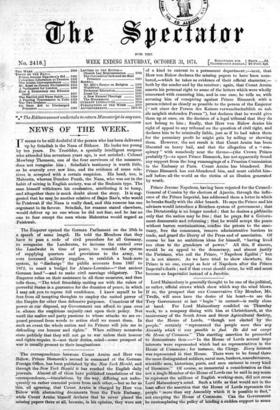The Emperor opened the German Parliament on the 29th in
a speech of some length. He told the Members that they have to pass a code of civil procedure for all Germany, to reorganise the Landsturm, to increase the control over the Landwehr in time of peace, to remodel the system of supplying quarters and provisions to the army, to vote increased military supplies, to establish a bank-note system, to " discharge " the public accounts from 1867 to 1872, to enact a budget for Alsace-Lorraine—" that ancient German land "—and to make civil marriage obligatory. The _Emperor relies on their assistance in all these measures, and then tells them, "The tried friendship uniting me with the rulers of -powerful States is a guarantee for the duration of peace, in which I may ask you to repose full confidence. I know myself to be free from all tempting thoughts to employ the united power of the Empire for other than defensive purposes. Conscious of thd power at our disposal, my Government can afford to pass over in silence the suspicions unjustly cast upon their policy. Not until the malice and party passicnas to whose attacks we are ex- posed proceed from words to action shall we resent them. In such an event the whole nation and its Princes will join me in -defending our honour and rights." When military monarchs state publicly that they will not go to war unless their honour and rights require it—not their duties, mind—some prospect of war is usually present to their imaginations.






































